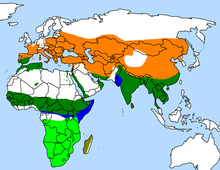Upupa
| Hoopoe | |
|---|---|
 |
|
|
Upupa epops
from Mangaon, Maharashtra, India |
|
| Scientific classification | |
| Kingdom: | Animalia |
| Phylum: | Chordata |
| Class: | Aves |
| Order: | Bucerotiformes |
| Family: |
Upupidae Leach, 1820 |
| Genus: |
Upupa Linnaeus, 1758 |
| Species: | U. epops |
| Binomial name | |
|
Upupa epops Linnaeus, 1758 |
|
 |
|
| Approximate native range. nesting resident (all year) wintering |
|
from Mangaon, Maharashtra, India
The hoopoe /ˈhuːpuː/ is a colourful bird found across Afro-Eurasia, notable for its distinctive "crown" of feathers. Three living and one extinct species are recognized, though for many years all were lumped as a single species—Upupa epops.
Upupa and epops are respectively the Latin and Ancient Greek names for the hoopoe; both, like the English name, are onomatopoeic forms which imitate the cry of the bird. In Ancient Egypt the species was known under two names. The earliest most probably having been *'db3.w' and/or *'db3.t') '(lit.:)the one who blocks up <its nesthole'>'.
Therefore also the early Egyptian word 'db<3>.t' (from which late Egyptian Demotic 'tby', Coptic 'toobe' and subsequently Arabic '(al-)tube' and French and English 'adobe' are derived) meaning sundried brick' ('lit.: 'the one that blocks up <a wall>') was often written with the 'hoopoe'-hieroglyph, here used as a phonogram. (See Sir A.H.Gardiner, 'Egyptian Grammar', Signlist G22 (hierogyph of) Hoopoe, used as Phonogram: ḏb/ḏbt. And cf. http://www. Dianabuja's Blog: Africa. The Middle East, Agriculture, History and Culture > Ebony and Adobe: Modern Words that Survive from Ancient Egypt -What, How and Why, 1)
The youngest name -dating from New Kingdom to late demotic texts- was 'kkp.t' (probably: 'koukoupat'), this name akin to Biblical Hebrew 'douchiphat', which word is apparently not formed from any Ancient Egyptian root. (drs. Carles Wolterman, Egyptologist)
The hoopoe was classified in the clade Coraciiformes, which also includes kingfishers, bee-eaters, and rollers. A close relationship between the hoopoe and the woodhoopoes is also supported by the shared and unique nature of their stapes. In the Sibley-Ahlquist taxonomy, the hoopoe is separated from the Coraciiformes as a separate order, the Upupiformes. Some authorities place the woodhoopoes in the Upupiformes as well. Now the consensus is that both hoopoe and the wood hoopoes belowng with the hornbills in the Bucerotiformes.
...
Wikipedia

